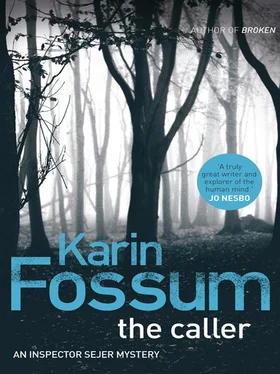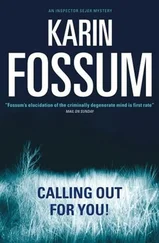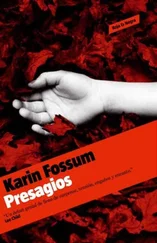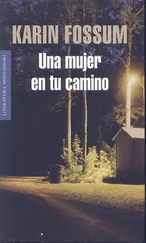‘A nightmarish descent into hell.’
Her name was Astrid Landmark. She had recently turned fifty-three. At fifty-nine her husband, Helge, seemed much older sitting in his wheelchair. She had wheeled him in front of the television, but he couldn’t follow the programme; he just sat there dozing, in the blue flicker of the screen. The light made him morbidly pale.
Astrid stood with her back to him. She held clothes that needed ironing. Because the paralysis rose in his body relentlessly, like tidewater, it was difficult to look him in the eye. Soon he wouldn’t be able to swallow, or talk or breathe. They understood this; they knew what to expect down to the smallest detail. The fear of death had sunk its claws in him, but he didn’t have the strength to fight back. She couldn’t stand it. She didn’t know where to look, what to say. Almost everything was taboo, almost nothing could be discussed. Phrases like until spring , or next Christmas , or another time had become impossible to utter; there wouldn’t be another time. They ought to discuss many things, important things about death and burial. And the cabin at Blefjell which he’d named El Dorado because it was such a money pit. Should she keep it? What about the house? Would she be able to maintain it? Would she be able to start the lawnmower? Manage the snowblower in the winter? Who would stain the house — it was already dry — or prune the fruit trees? Standing there with the iron, she was boiling hot. Strictly speaking, it wasn’t necessary to iron at all, because the shirts had gone into the dryer, and they were soft and smooth. But she preferred this kind of pottering, because it made her feel busy. As long as she stayed busy, he was quiet, and the truth, the awful truth, could be kept at bay. Now, with her back to him, he wouldn’t disturb her, she felt safe. Afterwards, she would have to make another trip to the cellar to load the washing machine again. She’d made plans to knead bread dough, wash the front-door window and sweep the kitchen floor. All while he sat in his wheelchair. As the fear crawled through him like ants. When she finally settled in beside him, on a recliner, he felt her despair, and he couldn’t bear it. When he asked her for help to lie down, she got an hour’s reprieve in the semi-darkness. There he lay crying against the wall of the bedroom as she watched television, sobbing.
She hung the newly ironed shirts on hangers. She heard him hawk and clear his throat — mucus in his airway — but he didn’t have the energy to cough. So it remained there gurgling in his throat. She was distracted by the gurgling; it was horrible. You would think he was a hundred years old instead of fifty-nine. She gripped the ironing board. She had to be strong and encouraging. She was supposed to stand by his side until he died, indefatigable, gentle and patient. She was supposed to help him die with dignity. But she couldn’t. Parts of herself she didn’t know existed had risen to the surface like poison. She cursed God and life, she cursed herself and her shortcomings, and she cursed death. But worst of all, in the blackest hours, she also cursed her husband, who was succumbing to this illness, to this miserable decline. It wasn’t part of the plan. He had always been big and strong, in charge, playful. He had taken care of things. Now his legs were useless, his skin no longer resembled skin; his skull looked as though it was covered with an old oilcloth. When she had these thoughts and admitted her own wretchedness, her own boundless cowardice, she fell apart even more. What if he knew how things really were and what she was really thinking? Could he feel it? Could he smell it? Was her betrayal perceptible in the room, did he hear it whispering in the corners? Was that why he’d stopped talking to her, even though he still could speak?
What was going through his mind?
When I’m dead, they’ll put me in the freezer, Astrid. I’ll have to lie there for several days. Then my cheeks will stiffen and turn cold as ice. Then I’ll burn, Astrid, in two-thousand-degree heat. It’s so hot the skeleton curls in the casket. I’m so scared, Astrid. Can’t you find a solution? Can’t you arrange a miracle? Can’t you slap my cheek and say, Wake up, Helge, you’re having a bad dream!
She pulled another shirt from the pile.
A blue shirt with a white collar and white cuffs, perhaps one of the best he owned. Even though she knew it would never be worn again, she ironed it as best she could; with all the buttons it was difficult. His throat no longer gurgled, and she didn’t like the silence either. When she glanced over her shoulder, she saw that his head had fallen to his chest, as if he was sleeping. Maybe he died, she thought, without my noticing. Then she heard him fumbling with something on the table, probably the remote control. No doubt he wanted to change the channel; there were many programmes he couldn’t watch. He couldn’t stand laughter and shouting, or loud music. His life was solemn, his world having narrowed to a dark passage where there was room only for himself: his fear, pain and sorrow.
Just then she looked out of the window. She heard something outside, a car, driving unusually slowly. It stopped at the gate for a few seconds then glided forward, a few metres past the driveway. Letting go of what she had in her hands, she craned her neck. The driver looked as though he was going to reverse into the driveway. What was this? They weren’t expecting anybody, and the car itself was rather strange. She remained still, staring. Perhaps I’m dreaming, she thought, this can’t be right. A large black car with a cross on its roof backed into the drive. She was about to faint. She held on to the ironing board, and glanced at her husband, who had also heard the car. The low, even hum from the motor, the tyres crunching gravel. A door slammed. Astrid Landmark panicked. She didn’t know what was going on. There was only one thing on her mind: Helge mustn’t see the car, not under any circumstances. He was unsettled. He put his hands on the wheels of his chair; he didn’t like people coming to the house, couldn’t bear anyone seeing him in this miserable state. Astrid went to the window. Perhaps she’d been mistaken? Maybe the car had some form of advertising on the roof, something she’d misunderstood. But it was a cross. The car was a hearse. A man in a dark suit had opened the rear door, and now stood looking up at the house. He seemed collected and composed. This was his profession. This was what he did every day to earn his wages.
‘Is someone coming?’ Helge asked anxiously. ‘Will they have to come inside?’ His voice had no strength.
Astrid held on to the windowsill. ‘No,’ she said quickly, ‘they’re not coming in.’
She was so confused that she could barely speak. As she saw Helge trying to manoeuvre the wheelchair towards the window, even though it cost him more energy than he possessed, she was seized by desperation.
‘Must be a mistake,’ she said. ‘I’ll go and talk to him.’
She trotted to the door, keeping her eyes on her husband. The chair was moving, its grey rubber wheels rolling slowly across the parquet floor.
‘No,’ she shouted. ‘Just sit!’
As if he could do anything else. But he could sense her panic, could sense that she was keeping something from him, and he didn’t want that. He wanted to look out of the window. He wanted to see what she saw. When she opened the door, he was halfway across the floor.
The man outside was about her age. He was immaculately dressed in a dark suit, and exceedingly polite. He extended a hand, bowing deeply and respectfully. ‘My condolences,’ he said.
‘What is this?’ she gasped.
He maintained his imperturbable calm. Perhaps he’d seen this before, this confusion. With the next of kin. When death had come to the house.
Читать дальше












